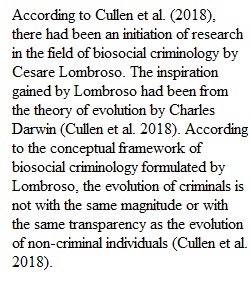


Q Universi Paper Topic 2 – Classical School and Biosocial Criminology Seminar in Criminology – CJ7020 (Feldmeyer) Instructions: Please pick 1 of the following questions (Choice A or Choice B… answer all parts of the Choice you pick) and write a response. Make sure to answer all parts of the question. Your response should be based on the evidence and findings from the lectures and reading. Your response should be 3-4 pages in length, double spaced (times new roman, 12pt font, 1 inch margins). Your paper is DUE 1-27-19 (Sunday) by Midnight, (your time zone). ______________________________________________________________________________ Choice A: DETERRENCE/RATIONAL CHOICE At a meeting of the American Society of Criminology, you attend a talk on Deterrence Theory. After the talk is over, someone in the audience turns to you and says: “There is no point in studying deterrence. It’s clear that punishment doesn’t make ‘model citizens,’ and we won’t ever punish our way to a perfect world. Criminologists would make better use of their time by studying other theories of crime and admit that deterrence doesn’t work very well and that punishment isn’t going to solve the crime problem. Don’t you agree?” After giving it some serious thought, you respond to the scholar’s statement with an answer that includes all of the following: 1. Support for the theory – when/where/for whom does deterrence/rational choice seem to work pretty well. 2. The key problems for theory – when/where/for whom does deterrence/rational choice NOT work. 3. Explain some of the newest directions in deterrence/rational choice theory. How do these new directions advance these perspectives and address the problems of the theory (or do they)? 4. In the end, based on all the evidence, do you agree or disagree with the audience member’s statement? Is there much value in deterrence/rational choice for criminology or should we spend our time elsewhere? Choice B: BIOSOCIAL CRIMINOLOGY At a meeting of the American Society of Criminology, you attend a talk on Biosocial Criminology. After the talk is over, someone in the audience turns to you and says: “Biosocial criminology seems like a waste of time. Someone explain to me how in the world biology could explain crime, if “crime” is defined differently in every society and throughout every era of history? Besides, even if we found biological causes of crime, we can’t do much about it … and in the wrong hands it could be dangerous. Criminologists could make better use of their time by studying other causes of crime rather than blaming crime on a crime gene or looking for “primitive” biological throwbacks in the human race. Don’t you agree?” After giving it some serious thought, you respond to the scholar’s statement with an answer that includes all of the following: 1. The ways in which biological approaches to crime have evolved and the history/trajectory of this research. 2. Discuss the current and newest waves of research in biosocial criminology, including the topics studies and the methods used, and describe the strengths of this new wave of research. In the end, and after reviewing the evidence, do you agree or disagree with the scholar’s comment? What is the value of biosocial research? Should we work to advance biosocial approaches to crime and is there value in biosocial research, or should we abandon this line of research as he/she suggests? ty of Cincinnati
View Related Questions